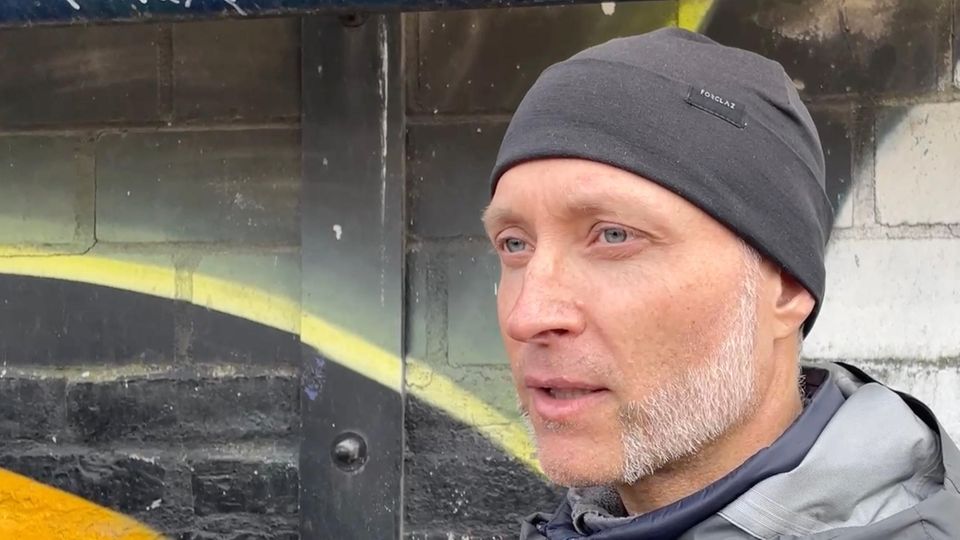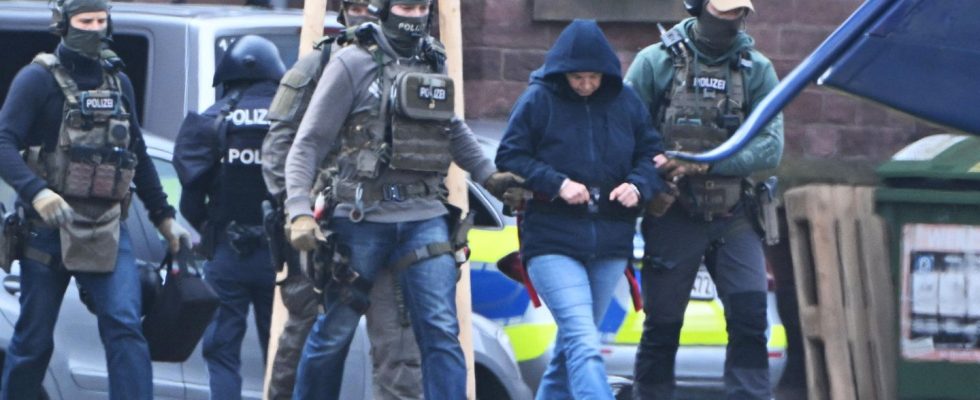Sim card thrown into toilet
“Unprofessional”: Two police unions argue about errors in RAF searches
In the courtyard of a government center in Karlsruhe, former RAF terrorist Daniela Klette is led to a helicopter
© Uli Deck / DPA
After the arrest of the former RAF terrorist Daniela Klette, who had been wanted for 30 years, there was criticism of the actions of the emergency services from Lower Saxony. In the state, the opinion on this is very clear.
Criticism of the Berlin Police Union (GdP) of the actions of the police from Lower Saxony in the arrest of the former RAF terrorist Daniela Klette caused upset. All efforts must be made to catch the terrorists, secondary theaters of war are “more than counterproductive,” said the German Police Union (DPolG) and the Association of German Criminal Officers (BDK) in Lower Saxony on Monday, responding to the critical voice of the rival union.
It is “unspeakable” and “unprofessional” if individuals in an ongoing procedure think that they “have to question and criticize the actions of their colleagues,” according to the German Police Union and the Association of German Criminal Investigators in Lower Saxony. A critical review of the operation will “take place promptly and, above all, internally”.
Sim card thrown into toilet
The Berlin GdP had previously criticized its colleagues in Lower Saxony in an unusually harsh manner and accused them of wanting to raise their profile. Accordingly, the LKA Lower Saxony, which is in charge, must examine the operation on February 26th self-critically: “In view of everything that was found on Ms. Klette, it is pure luck that she did not wait behind the door with the bazooka and that none of our colleagues were injured .” According to the GdP, there are capable special units in the capital for such arrests.
Klette is said to have been allowed to use the toilet in her apartment by the LKA investigators from Lower Saxony. She sent a message to her former accomplice Burkhard Garweg and then threw the SIM card into the toilet. Garweg’s cell phone is said to have no longer been used after that. Klette is now in custody, and Garweg is being searched for with current photos.

Klette, Garweg and the third wanted ex-RAF terrorist Ernst-Volker Staub went into hiding more than 30 years ago. All three belonged to the so-called third generation of the left-wing extremist terrorist organization Red Army Faction, which carried out numerous attacks and killed people until 1991.
BKA President Holger Münch has since confirmed that Klette had the opportunity to give a warning when he was arrested. “I don’t want to call this a mistake,” said the President of the Federal Criminal Police Office on Sunday evening in the ARD program “Report from Berlin.” “These are simply things that you can’t rule out.” It was one of over a thousand routine checks, said Münch. “You don’t just go straight through the door with a ram, but the point was to determine: Is this person, to whom a trace pointed, possibly Mrs. Klette or not?”
Behavior during RAF search “like the Russians in Prague”
Münch explained: “It happened that you knocked on the door and then identified yourself and it took a moment until Ms. Klette opened the door.” She said she would open the door straight away. And during this period, Klette was actually able to warn someone. “Conversely, if it hadn’t been Ms. Burdock and someone had rammed the door and knocked someone down, then we would have talked about a mistake. That means you’re always smarter afterwards.”
Münch does not expect rapid success in the further search. It is hoped that the traces from the search measures and possible new clues will ultimately lead to a successful search. “I currently doubt whether this will take place in the short term. But we have a significantly better situation than before Ms. Klette was attacked.”
Even in the time after Klette’s arrest, there was some surprise at the actions of the officials from Lower Saxony. According to “Tagesspiegel”, a Berlin official said: “They behave like the Russians in Prague,” alluding to the Soviet Union’s invasion of the capital of the former Czechoslovakia in 1968.

